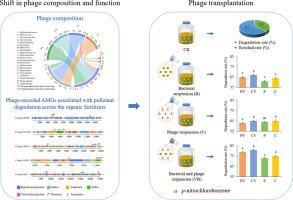当前位置:
X-MOL 学术
›
Environ. Int.
›
论文详情
Our official English website, www.x-mol.net, welcomes your
feedback! (Note: you will need to create a separate account there.)
Phages in vermicomposts enrich functional gene content and facilitate pesticide degradation in soil
Environment International ( IF 10.3 ) Pub Date : 2023-08-30 , DOI: 10.1016/j.envint.2023.108175 Huizhen Chao 1 , Jose Luis Balcazar 2 , Yunling Wu 1 , Anjuan Cai 3 , Mao Ye 4 , Mingming Sun 1 , Feng Hu 1
Environment International ( IF 10.3 ) Pub Date : 2023-08-30 , DOI: 10.1016/j.envint.2023.108175 Huizhen Chao 1 , Jose Luis Balcazar 2 , Yunling Wu 1 , Anjuan Cai 3 , Mao Ye 4 , Mingming Sun 1 , Feng Hu 1
Affiliation

|
Organic fertilizer microbiomes play substantial roles in soil ecological functions, including improving soil structure, crop yield, and pollutant dissipation. However, limited information is available about the ecological functions of phages and phage-encoded auxiliary metabolic genes (AMGs) in orga9nic fertilizers. Here we used a combination of metagenomics and phage transplantation trials to investigate the phage profiles and their potential roles in pesticide degradation in four organic fertilizers from different sources. Phage annotation results indicate that the two vermicomposts made from swine (PV) and cattle (CV) dung had more similar phage community structures than the swine (P) and cattle (C) manures. After vermicomposting, the organic fertilizers (PV and CV) exhibited enriched phage-host pairings and phage AMG diversity in relative to the two organic fertilizers (P and C) without composting. In addition, the number of broad-host-range phages in the vermicomposts (182) was higher than that in swine (153) and cattle (103) manures. Notably, phage AMGs associated with metabolism and pesticide biodegradation were detected across the four organic fertilizers. The phage transplantation demonstrated that vermicompost phages were most effective at facilitating the degradation of pesticide precursor -nitrochlorobenzene (-NCB) in soil, as compared to swine and cattle manures ( < 0.05). Taken together, our findings highlight the significance of phages in vermicompost for biogeochemical cycling and biodegradation of pesticide-associated chemicals in contaminated soils.
中文翻译:

蚯蚓堆肥中的噬菌体丰富了功能基因含量并促进了土壤中农药的降解
有机肥料微生物组在土壤生态功能中发挥着重要作用,包括改善土壤结构、作物产量和污染物消散。然而,关于有机肥料中噬菌体和噬菌体编码的辅助代谢基因(AMG)的生态功能的信息有限。在这里,我们结合宏基因组学和噬菌体移植试验来研究噬菌体谱及其在四种不同来源的有机肥料中农药降解中的潜在作用。噬菌体注释结果表明,由猪(PV)和牛(CV)粪便制成的两种蚯蚓堆肥比猪(P)和牛(C)粪便具有更相似的噬菌体群落结构。与未经堆肥的两种有机肥料(P 和 C)相比,经过蚯蚓堆肥后,有机肥料(PV 和 CV)表现出丰富的噬菌体-宿主配对和噬菌体 AMG 多样性。此外,蚯蚓堆肥中广泛宿主范围噬菌体的数量(182)高于猪(153)和牛(103)粪便中的噬菌体数量。值得注意的是,在四种有机肥料中检测到了与新陈代谢和农药生物降解相关的噬菌体 AMG。噬菌体移植表明,与猪和牛粪便相比,蚯蚓堆肥噬菌体在促进土壤中农药前体-硝基氯苯(-NCB)降解方面最有效(<0.05)。总而言之,我们的研究结果强调了蚯蚓堆肥中的噬菌体对于受污染土壤中农药相关化学物质的生物地球化学循环和生物降解的重要性。
更新日期:2023-08-30
中文翻译:

蚯蚓堆肥中的噬菌体丰富了功能基因含量并促进了土壤中农药的降解
有机肥料微生物组在土壤生态功能中发挥着重要作用,包括改善土壤结构、作物产量和污染物消散。然而,关于有机肥料中噬菌体和噬菌体编码的辅助代谢基因(AMG)的生态功能的信息有限。在这里,我们结合宏基因组学和噬菌体移植试验来研究噬菌体谱及其在四种不同来源的有机肥料中农药降解中的潜在作用。噬菌体注释结果表明,由猪(PV)和牛(CV)粪便制成的两种蚯蚓堆肥比猪(P)和牛(C)粪便具有更相似的噬菌体群落结构。与未经堆肥的两种有机肥料(P 和 C)相比,经过蚯蚓堆肥后,有机肥料(PV 和 CV)表现出丰富的噬菌体-宿主配对和噬菌体 AMG 多样性。此外,蚯蚓堆肥中广泛宿主范围噬菌体的数量(182)高于猪(153)和牛(103)粪便中的噬菌体数量。值得注意的是,在四种有机肥料中检测到了与新陈代谢和农药生物降解相关的噬菌体 AMG。噬菌体移植表明,与猪和牛粪便相比,蚯蚓堆肥噬菌体在促进土壤中农药前体-硝基氯苯(-NCB)降解方面最有效(<0.05)。总而言之,我们的研究结果强调了蚯蚓堆肥中的噬菌体对于受污染土壤中农药相关化学物质的生物地球化学循环和生物降解的重要性。































 京公网安备 11010802027423号
京公网安备 11010802027423号